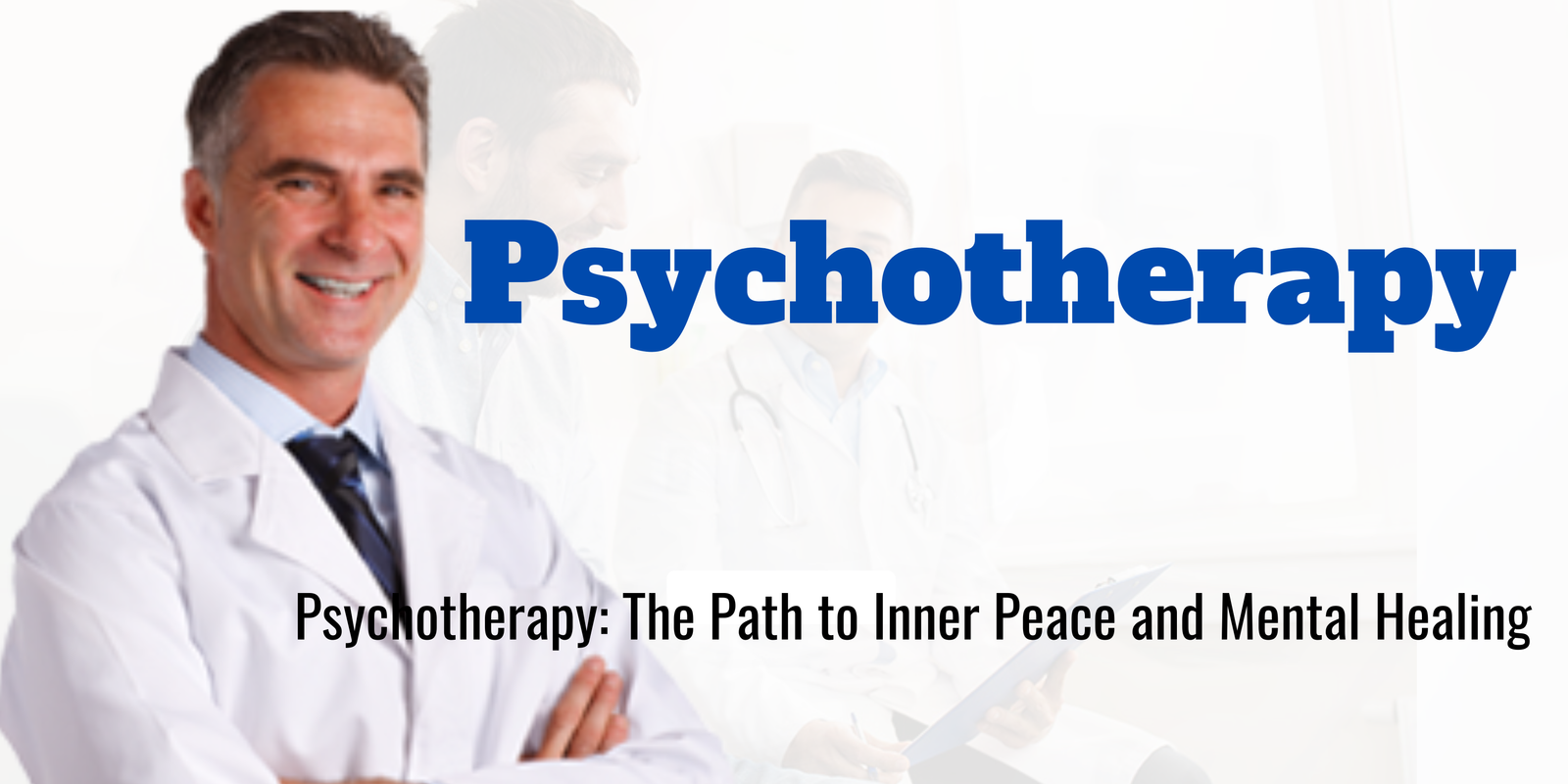
introduction
Do you often feel like your mind is racing, or that you’re carrying an emotional burden that you can’t shake? You’re not alone—many people struggle with mental health challenges that affect their peace of mind.
But what if there was a way to heal and find balance? Psychotherapy offers a path to mental clarity, emotional well-being, and lasting peace.
What Is Psychotherapy?
Psychotherapy, often referred to as “talk therapy,” is a treatment that involves speaking with a trained mental health professional to address emotional and psychological issues. It is used to help individuals cope with various mental health challenges, such as anxiety, depression, stress, trauma, and relationship problems. Through psychotherapy, individuals can gain insight into their thoughts, feelings, and behaviors, and learn effective ways to manage and overcome difficulties.
How Psychotherapy Promotes Inner Peace
Psychotherapy is a powerful tool for improving mental health and well-being. It helps individuals understand and manage their emotions, thoughts, and behaviours, ultimately promoting inner peace. By addressing unresolved issues, processing emotions, and learning coping strategies, psychotherapy can lead to a sense of calm and emotional balance. In this article, we will explore how psychotherapy contributes to inner peace.
1. Understanding and Addressing Emotional Struggles
One of the main ways psychotherapy promotes inner peace is by helping individuals confront and understand their emotional struggles. Whether it’s anxiety, sadness, anger, or fear, therapy provides a safe space to talk about these emotions without judgment. By expressing these feelings and gaining insight into their causes, individuals can begin to process and release them, reducing emotional turmoil.

2. Developing Healthy Coping Mechanisms
Psychotherapy teaches individuals how to cope with life’s challenges in healthy ways. Many people use unhealthy coping strategies such as avoidance or substance abuse, which can lead to further distress. Through therapy, individuals learn healthier ways to manage stress, such as mindfulness, deep breathing exercises, or problem-solving techniques. These strategies contribute to emotional resilience and inner peace.

3. Improving Self-Awareness and Self-Acceptance
Psychotherapy encourages self-reflection and self-awareness. By gaining a deeper understanding of their thoughts, feelings, and behaviours, individuals can identify patterns that may be contributing to their emotional struggles. This self-awareness leads to greater self-acceptance, allowing individuals to embrace their flaws and strengths without judgment. This acceptance is essential for achieving inner peace.

4. Healing Past Trauma
Past trauma, whether from childhood or recent experiences, can disrupt inner peace. Psychotherapy provides a space for individuals to confront and heal from these painful memories. By processing trauma in a supportive environment, individuals can release the grip it has on their present lives and start to heal. This healing process is crucial for finding emotional balance and peace.

5. Strengthening Relationships and Social Support
Psychotherapy not only focuses on the individual but can also improve relationships with others. By working on communication skills, emotional regulation, and empathy, individuals can build stronger, healthier connections with loved ones. Positive relationships contribute to a sense of belonging and support, both of which are important for maintaining inner peace.

6. Promoting a Balanced Perspective on Life
Through therapy, individuals often learn to reframe their thinking and gain a more balanced perspective on life. Cognitive behavioural therapy (CBT), for example, helps people challenge negative or unrealistic thoughts and replace them with healthier, more balanced ones. This shift in thinking can reduce feelings of anxiety, depression, and stress, allowing individuals to experience greater peace of mind.

Conclusion
Psychotherapy is an effective way to promote inner peace. By understanding and addressing emotional struggles, developing healthy coping mechanisms, improving self-awareness and self-acceptance, healing from trauma, strengthening relationships, and fostering a balanced perspective on life, individuals can achieve greater emotional stability. If you’re seeking peace within yourself, psychotherapy can be an essential part of the journey toward mental and emotional well-being.

Mental Healing Through Psychotherapy
Mental healing through psychotherapy is a transformative process that can help individuals overcome emotional pain, trauma, and mental health challenges. Psychotherapy provides a safe space where people can explore their thoughts and feelings, develop coping skills, and work through difficult experiences. In this article, we will examine how psychotherapy contributes to mental healing and how it can improve overall well-being.
1. Addressing Emotional and Psychological Pain
Mental healing through psychotherapy begins with addressing emotional and psychological pain. People often carry unresolved feelings of grief, sadness, guilt, or shame, which can deeply affect their mental health. Therapy allows individuals to express these emotions in a safe, non-judgmental environment. By talking about their feelings and understanding their origins, individuals can begin to process their pain and move toward healing.

2. Healing from Trauma
One of the most powerful ways psychotherapy promotes mental healing is by helping individuals heal from past trauma. Traumatic experiences, whether from childhood, abuse, or other life events, can leave lasting scars on mental health. Psychotherapy techniques, such as trauma-focused therapy or EMDR (Eye Movement Desensitization and Reprocessing), help individuals process and reframe traumatic memories, reducing their emotional impact and allowing healing to take place.

3. Improving Emotional Regulation
Many people struggle with managing their emotions, especially in difficult situations. Psychotherapy teaches individuals how to recognize and regulate their emotions, reducing emotional outbursts or feelings of overwhelming anxiety. Techniques such as mindfulness, relaxation exercises, and cognitive restructuring help individuals gain control over their emotional responses. This improved emotional regulation is a key component of mental healing.

4. Building Self-Worth and Confidence
A key part of mental healing through psychotherapy is rebuilding self-worth and confidence. Many individuals who seek therapy may struggle with low self-esteem or negative self-beliefs. Through therapy, people learn to challenge these negative thoughts and develop a healthier, more positive self-image. As individuals build their confidence and sense of self-worth, they experience greater emotional strength and stability.

5. Developing Healthy Coping Mechanisms
Mental healing requires the development of healthy coping mechanisms for managing stress, anxiety, and other challenges. Psychotherapy equips individuals with practical tools to deal with life’s difficulties. Whether through cognitive-behavioural therapy (CBT), dialectical behaviour therapy (DBT), or other therapeutic approaches, individuals learn effective coping strategies such as problem-solving, mindfulness, and stress management techniques.

6. Strengthening Relationships and Social Support
Mental healing is not just about individual work—it also involves improving relationships with others. Psychotherapy can enhance communication skills, emotional intelligence, and empathy, helping individuals build healthier, more supportive relationships. These positive connections are crucial for emotional healing and overall mental well-being.

7. Fostering a Balanced Perspective on Life
Through psychotherapy, individuals often learn to adopt a more balanced and realistic perspective on life. Cognitive-behavioural techniques help people challenge negative thinking patterns, such as catastrophizing or black-and-white thinking, and replace them with more balanced and constructive thoughts. This shift in perspective can reduce feelings of hopelessness, anxiety, or depression, and support mental healing.

Conclusion
Mental healing through psychotherapy is a profound journey that involves addressing emotional pain, healing from trauma, improving emotional regulation, building self-worth, developing healthy coping strategies, and fostering supportive relationships. By participating in psychotherapy, individuals can experience deep mental healing and achieve a sense of balance and well-being. If you are seeking to heal emotionally and mentally, psychotherapy offers the tools and support necessary for recovery and growth.

Types of Psychotherapy
Psychotherapy, also known as talk therapy, is a treatment option for individuals dealing with mental health issues, emotional challenges, and personal growth. There are various types of psychotherapy, each with its unique approach to healing. Understanding the different types can help you choose the right one for your needs. In this article, we will explore the main types of psychotherapy and how they can contribute to mental well-being.
1. Cognitive Behavioral Therapy (CBT)
Cognitive Behavioral Therapy (CBT) is one of the most widely used types of psychotherapy. It focuses on identifying and changing negative thought patterns and behaviours. CBT helps individuals recognize how their thoughts influence their emotions and actions. By challenging irrational thoughts and replacing them with more balanced perspectives, CBT can be effective for treating depression, anxiety, and stress-related disorders.

2. Psychodynamic Therapy
Psychodynamic therapy is based on the idea that unconscious thoughts and past experiences shape current behaviours and emotions. In this type of therapy, individuals explore their childhood, relationships, and unresolved conflicts to gain insight into their present struggles. By understanding these deeper issues, individuals can work through unresolved emotional problems and improve their mental health. Psychodynamic therapy is particularly helpful for individuals dealing with long-term emotional difficulties or relationship issues.

3. Dialectical Behavior Therapy (DBT)
Dialectical Behavior Therapy (DBT) is a form of psychotherapy that focuses on teaching individuals how to manage intense emotions, improve relationships, and reduce self-destructive behaviours. DBT was initially developed for individuals with borderline personality disorder but has since been used to treat a variety of conditions, including depression, anxiety, and eating disorders. DBT combines cognitive-behavioural techniques with mindfulness practices to help individuals develop better emotional regulation and interpersonal skills.

4. Humanistic Therapy
Humanistic therapy emphasizes personal growth, self-awareness, and the innate potential for self-healing. The therapist provides a supportive and empathetic environment where individuals can explore their feelings and experiences. The goal of humanistic therapy is to help individuals achieve self-actualization—a sense of fulfillment and personal development. This type of therapy is often used to treat individuals dealing with issues such as low self-esteem, identity confusion, or personal life transitions.

5. Family Therapy
Family therapy involves working with families to improve communication, resolve conflicts, and strengthen relationships. In family therapy, the therapist helps family members understand how their interactions contribute to family dynamics and emotional well-being. Family therapy is especially useful for addressing issues such as parenting challenges, relationship breakdowns, or family trauma. It can also be effective in treating adolescent behavioural problems and improving family support systems.

6. Group Therapy
Group therapy involves a small group of individuals who meet regularly to discuss their issues with the guidance of a therapist. This type of therapy provides a supportive environment where individuals can share experiences, gain insights from others, and develop social connections. Group therapy is often used in conjunction with individual therapy for conditions like depression, anxiety, addiction, and trauma. It helps individuals feel less isolated and provides them with valuable feedback from peers facing similar challenges.

7. Exposure Therapy
Exposure therapy is a form of psychotherapy used to treat anxiety disorders, such as phobias and post-traumatic stress disorder (PTSD). In exposure therapy, individuals are gradually exposed to the situations, objects, or memories that trigger their anxiety, under the guidance of a therapist. Over time, this repeated exposure helps individuals become less fearful and more capable of handling anxiety-provoking situations. Exposure therapy is often used in combination with CBT for maximum effectiveness.

8. Eye Movement Desensitization and Reprocessing (EMDR)
Eye Movement Desensitization and Reprocessing (EMDR) is a specialized therapy that helps individuals process and heal from trauma. It involves using bilateral stimulation, such as guided eye movements, to help the brain reprocess traumatic memories in a healthier way. EMDR is particularly effective for individuals dealing with PTSD and trauma-related disorders. It helps reduce the emotional intensity of distressing memories, making them easier to manage.

Conclusion
There are many types of psychotherapy, each offering unique benefits depending on the individual’s needs and challenges. Whether you’re dealing with anxiety, trauma, relationship issues, or personal growth, there is a psychotherapy approach that can help you heal and thrive. By understanding the different types of therapy, you can choose the one that aligns with your goals and start your journey toward better mental health.

Benefits of Psychotherapy
Psychotherapy, also known as talk therapy, offers numerous benefits for individuals seeking to improve their mental health and overall well-being. Whether you’re facing emotional challenges, mental health disorders, or simply want to understand yourself better, psychotherapy can provide valuable tools and support for healing and personal growth. In this article, we will explore the key benefits of psychotherapy and how it can enhance your life.
1. Improved Mental Health
One of the primary benefits of psychotherapy is the improvement of mental health. Psychotherapy can help individuals manage symptoms of various mental health disorders, such as depression, anxiety, and PTSD. Through therapeutic techniques, individuals can learn to cope with negative thoughts and emotions, leading to better emotional balance. Over time, this can significantly reduce the impact of mental health conditions and improve overall well-being.

2. Better Emotional Regulation
Psychotherapy helps individuals learn how to manage and regulate their emotions more effectively. Many people struggle with overwhelming feelings, such as anger, sadness, or anxiety. In therapy, individuals develop emotional awareness and learn coping mechanisms to deal with intense emotions in a healthy way. This improved emotional regulation can lead to less emotional reactivity, better decision-making, and greater emotional stability.

3. Enhanced Self-Awareness
Another important benefit of psychotherapy is increased self-awareness. Therapy provides a safe space for individuals to explore their thoughts, feelings, and behaviours. Through self-reflection, people gain deeper insight into their motivations, patterns, and life choices. This self-awareness fosters personal growth and helps individuals make more informed decisions, leading to a more fulfilling life.

4. Improved Relationships
Psychotherapy can greatly improve relationships, whether they are romantic, familial, or social. By learning better communication skills, emotional regulation, and conflict resolution techniques, individuals can build stronger and healthier connections with others. Therapy also helps individuals understand and address the underlying issues that may be affecting their relationships, leading to more harmonious interactions and a stronger support network.

5. Increased Self-Esteem and Confidence
Through psychotherapy, individuals can work on improving their self-esteem and self-worth. Many people struggle with negative self-beliefs, such as feelings of inadequacy or low confidence. Therapy helps challenge these beliefs and replace them with a healthier, more positive self-image. As individuals build confidence and self-esteem, they experience greater emotional strength and a more positive outlook on life.

6. Stress Reduction
Psychotherapy offers effective tools for managing and reducing stress. Life can often feel overwhelming, and chronic stress can lead to physical and emotional health problems. Therapy provides strategies to cope with stress more effectively, such as relaxation techniques, mindfulness, and problem-solving skills. Learning to manage stress can improve overall health, reduce anxiety, and create a greater sense of peace and balance in daily life.

7. Healing from Trauma
For individuals who have experienced trauma, psychotherapy can be a powerful tool for healing. Trauma, whether from childhood, abuse, or other life events, can leave lasting emotional scars. Psychotherapy helps individuals process and work through traumatic memories in a safe and supportive environment. Specialized therapies, such as EMDR or trauma-focused CBT, can help reduce the emotional impact of trauma and promote healing.

8. Personal Growth and Goal Achievement
Psychotherapy encourages personal growth by helping individuals identify their goals, values, and aspirations. Through therapy, people can gain clarity on what they want to achieve in life and develop the skills necessary to reach their goals. Whether it’s improving career prospects, enhancing relationships, or achieving personal well-being, psychotherapy supports individuals in their journey toward self-improvement and success.

9. Better Coping Skills
Life can present many challenges, and psychotherapy equips individuals with the coping skills needed to navigate them. Therapy teaches problem-solving, decision-making, and emotional regulation, all of which are essential for managing life’s ups and downs. With these improved coping skills, individuals are better prepared to handle difficult situations with resilience and confidence.

Conclusion
The benefits of psychotherapy are vast and can greatly improve mental health, emotional well-being, and overall quality of life. Whether you’re seeking to manage mental health disorders, improve relationships, reduce stress, or achieve personal growth, psychotherapy provides valuable tools and support. If you’re considering therapy, know that it can be a transformative experience that leads to greater self-awareness, healing, and lasting positive change.

Who Should Consider Psychotherapy?
Psychotherapy can benefit individuals from all walks of life. Whether you’re dealing with a specific mental health challenge, going through a difficult life transition, or simply seeking personal growth, psychotherapy can provide valuable tools for emotional healing and well-being. In this article, we will explore who should consider psychotherapy and how it can help improve mental and emotional health.
1. Individuals Struggling with Mental Health Disorders
Anyone dealing with mental health conditions such as depression, anxiety, PTSD, or bipolar disorder should strongly consider psychotherapy. Therapy is an effective treatment option for managing the symptoms of these disorders and can provide individuals with the tools to better understand and manage their condition. Psychotherapy helps address the root causes of mental health issues, providing relief from symptoms and promoting emotional stability.

2. People Dealing with Chronic Stress or Burnout
Chronic stress can have a significant impact on both mental and physical health. If you are feeling overwhelmed by work, personal life, or other responsibilities, psychotherapy can help you develop effective coping strategies. A therapist can guide you in identifying stressors, managing your reactions, and learning how to create balance in your life, ultimately reducing the risk of burnout and improving your overall well-being.

3. Individuals Experiencing Relationship Issues
Whether you are facing challenges in a romantic relationship, with family members, or in friendships, psychotherapy can help. Relationship difficulties can often stem from poor communication, unresolved conflicts, or emotional baggage. Therapy provides a safe space to address these issues, improve communication skills, and learn healthier ways to interact with others. Couples and family therapy are also effective for resolving relationship problems and strengthening bonds.

4. People Going Through Major Life Transitions
Life transitions, such as a divorce, the loss of a loved one, career changes, or moving to a new place, can bring about feelings of confusion, sadness, or anxiety. Psychotherapy can help individuals navigate these changes by providing support and helping them adjust to new circumstances. A therapist can also assist in finding meaning and purpose during these transitional periods, ultimately supporting emotional healing and growth.

5. Individuals Struggling with Low Self-Esteem or Confidence
People who struggle with low self-esteem or confidence may benefit greatly from psychotherapy. Negative self-beliefs can hold individuals back from achieving their goals and lead to feelings of inadequacy. In therapy, individuals can work on challenging these negative thoughts, building self-worth, and learning to embrace their strengths. This process helps boost confidence and empowers individuals to live more fulfilling lives.

6. Those Seeking Personal Growth and Self-Improvement
Psychotherapy isn’t just for individuals facing mental health issues; it can also be a tool for personal growth and self-improvement. Many people seek therapy to better understand themselves, set personal goals, and improve their emotional intelligence. Therapy provides a space for self-reflection, helping individuals become more self-aware and achieve their full potential. Whether you’re working on personal development or striving to live a more balanced life, psychotherapy can be a valuable resource.

7. People Experiencing Trauma or Grief
Individuals who have experienced trauma, such as abuse, accidents, or loss, can benefit from psychotherapy. Trauma often leaves deep emotional scars, which can affect how individuals cope with life and interact with others. Therapy helps people process traumatic experiences, heal emotional wounds, and reduce the long-term effects of trauma. Whether you are dealing with grief from a loss or trauma from a past experience, psychotherapy can provide the support needed for healing.

8. Those Facing Addiction or Substance Abuse Issues
Psychotherapy is a critical part of the recovery process for individuals dealing with addiction or substance abuse. Therapy helps individuals explore the underlying causes of their addiction, develop healthier coping mechanisms, and create strategies for maintaining long-term sobriety. Cognitive-behavioural therapy (CBT) and other therapeutic approaches are commonly used to treat addiction, providing the support necessary for overcoming challenges and rebuilding a fulfilling life.

9. Anyone Looking to Improve Their Mental Well-Being
Even if you’re not facing a specific mental health condition or life crisis, psychotherapy can still be beneficial. People who want to improve their mental well-being, reduce stress, and build emotional resilience can benefit from therapy. Regular sessions can help individuals stay emotionally healthy, better manage life’s challenges, and maintain a positive outlook. Therapy is an investment in long-term mental wellness.

Conclusion
Psychotherapy can benefit a wide range of individuals. Whether you are struggling with mental health disorders, navigating life transitions, seeking personal growth, or looking to improve relationships, therapy offers valuable tools for emotional healing and growth. If you’re facing any of the challenges mentioned above, psychotherapy can be a powerful way to improve your mental and emotional well-being. It provides the support, guidance, and strategies needed to live a healthier and more fulfilling life.

How to Start Your Journey Towards Inner Peace?
Achieving inner peace is a process that involves finding balance, tranquility, and emotional stability in your life. It’s about gaining control over your thoughts, managing stress, and fostering a sense of calm, no matter the external circumstances. Psychotherapy can play a crucial role in helping individuals work towards inner peace. In this article, we will explore steps you can take to begin your journey towards inner peace, with psychotherapy as a valuable tool for healing and growth.
1. Acknowledge Your Current Emotional State
The first step in your journey towards inner peace is to acknowledge where you currently stand emotionally. Are you dealing with anxiety, stress, anger, or sadness? Understanding your emotional state without judgment allows you to recognize areas that need attention. Psychotherapy can help you explore these feelings more deeply, uncover their causes, and provide insights into how you can manage them moving forward.

2. Consider Psychotherapy for Support
Psychotherapy offers a structured way to explore your thoughts and emotions. A therapist can provide guidance, tools, and coping strategies to help you manage the challenges in your life. Through therapy, you will gain a deeper understanding of your emotions, develop healthier thinking patterns, and learn effective techniques for calming your mind. Whether you choose cognitive behavioral therapy (CBT), mindfulness-based therapy, or another approach, psychotherapy can be a valuable resource in your journey towards inner peace.

3. Practice Mindfulness and Meditation
Mindfulness and meditation are powerful practices that can help you cultivate inner peace. These techniques allow you to focus on the present moment, reducing stress and preventing negative thought patterns from taking over. Meditation helps quiet the mind and encourages a sense of calm, while mindfulness teaches you to be more aware of your thoughts, feelings, and surroundings without judgment. Incorporating these practices into your daily routine can significantly contribute to your emotional well-being.

4. Challenge Negative Thought Patterns
Negative thinking can create inner turmoil and prevent you from achieving peace of mind. Common patterns include self-criticism, rumination, and catastrophic thinking. Psychotherapy can help you recognize these patterns and work on replacing them with healthier, more balanced thoughts. By challenging and reframing negative thoughts, you can reduce anxiety and increase your sense of control over your emotions, moving closer to inner peace.

5. Establish Healthy Boundaries
Creating healthy boundaries is an essential part of maintaining your inner peace. This means learning how to say no when necessary, setting limits in relationships, and prioritizing your well-being. Psychotherapy can help you identify areas where you may be overextending yourself or neglecting your needs. Through therapy, you can build the confidence to assert yourself and protect your emotional space, leading to a more peaceful, balanced life.

6. Engage in Self-Care Practices
Self-care is a vital aspect of achieving inner peace. Taking care of your physical, emotional, and mental health helps you maintain balance and prevent burnout. Activities such as exercise, spending time in nature, eating nutritious foods, and engaging in hobbies can nurture your well-being. Psychotherapy can support you in finding self-care practices that resonate with you and help you feel more grounded and at peace with yourself.

7. Cultivate Gratitude and Positivity
Focusing on gratitude can shift your mindset and bring more positivity into your life. By regularly reflecting on the things you are grateful for, you can foster a greater sense of peace and contentment. Psychotherapy can help you develop a gratitude practice and teach you how to reframe negative experiences into learning opportunities. This positive outlook can help reduce stress and promote a sense of calm.

8. Let Go of Past Resentments
Holding onto past resentments and grudges can create emotional baggage that prevents inner peace. Psychotherapy can assist you in working through unresolved issues, forgiving others, and letting go of anger. By releasing these negative emotions, you free yourself from their hold and create space for peace and healing.

9. Commit to Ongoing Growth and Healing
Achieving inner peace is an ongoing journey. Psychotherapy encourages continuous personal growth, self-awareness, and healing. As you work through emotional challenges, develop new coping strategies, and practice self-care, you’ll move closer to a state of lasting peace. Remember that this is a process, and it’s okay to take your time.

Conclusion
Starting your journey towards inner peace involves understanding and addressing your emotional needs, seeking support through psychotherapy, and committing to practices that nurture your well-being. Psychotherapy can help you overcome emotional challenges, develop healthier thought patterns, and achieve a more peaceful, balanced life. By combining therapy with practices such as mindfulness, self-care, and gratitude, you can build a foundation for lasting inner peace and emotional stability.

Conclusion: The Path to Inner Peace Through Psychotherapy
In conclusion, the journey towards inner peace is a deeply personal process that involves healing, self-awareness, and emotional growth. Psychotherapy is a powerful tool that can guide you through this journey, helping you to address emotional challenges, understand the root causes of your feelings, and develop strategies for maintaining peace in your life. Whether you are dealing with anxiety, stress, past trauma, or simply seeking personal growth, psychotherapy provides the support and guidance needed to navigate these challenges.
By embracing psychotherapy, you can gain the tools to manage your emotions, cultivate positive thinking, and improve your relationships. In turn, these benefits contribute to a sense of inner peace and balance. Remember, inner peace is not a destination but an ongoing journey, and psychotherapy can be an essential part of that path.
If you’re ready to begin your own journey towards inner peace, consider reaching out to a qualified therapist who can support you in taking the first steps towards emotional healing and stability. With time, patience, and commitment, you can achieve lasting peace within yourself.







